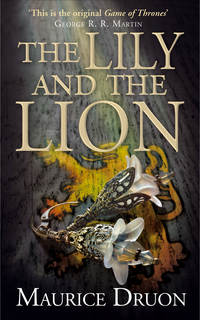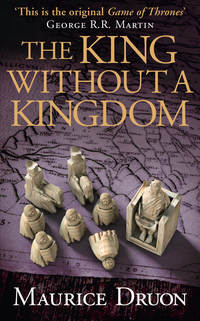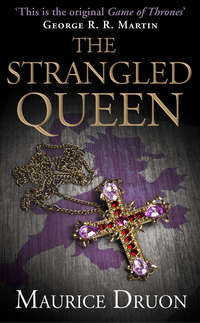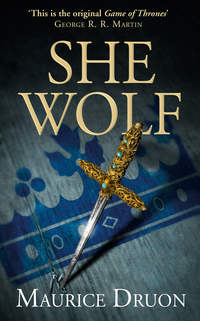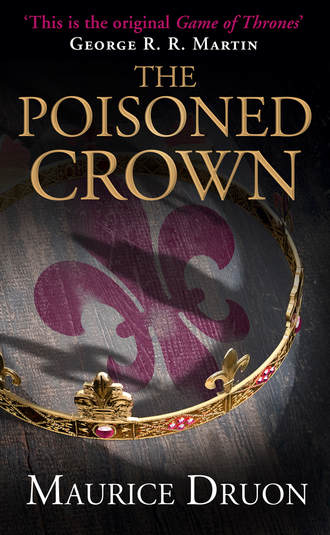
Полная версия
The Poisoned Crown
‘Where are you taking that wine?’ the King asked the wagoners who were floundering in the clay.
‘To Monseigneur the Count of Artois, Sire,’ one of them replied.
The Hutin looked at them for a moment with his huge pale eyes, shook his head and turned away without another word.
‘As I was saying, Sire,’ Gaucher continued, ‘we may still have some wine to drink today, but don’t count on it for tomorrow. Oh, I should have given you more insistent counsel. I was of the opinion that we should have stopped earlier, establishing ourselves on high ground rather than advancing into this morass. Both my cousin of Valois7 and yourself insisted that we should advance and I feared to be taken for a coward and that my age would be blamed if I stopped the army moving forward. I was wrong.’
Charles of Valois was about to reply when the King asked, ‘And the Flemings?’
‘They’re opposite us, on the other side of the river, in as great numbers as we and no more happy, I should think, though they are nearer their supplies, and are maintained by the people of their towns and villages. If the flood waters should diminish tomorrow, they’ll be better prepared to attack us than we shall be to fall on them.’
Charles of Valois shrugged his shoulders.
‘Come now, Gaucher, the rain’s depressed your spirits,’ he said. ‘You’re not going to make me believe that a good cavalry charge won’t account for that rabble of weavers. They’ve only got to see our lines of breastplates and our forest of lances to be off like a flock of sparrows.’
The Count was superb in his surcoat of gold-embroidered silk which he wore over his coat of mail and in spite of the mud that covered him; indeed, he looked more kingly than the King himself.
‘You make it quite clear, Charles,’ the Constable replied, ‘that you were not at Courtrai thirteen years ago. You were then fighting in Italy, not for France but for the Pope. But I’ve seen that rabble, as you call it, destroy our knights when they acted too precipitately.’
‘That was doubtless because I was not there,’ said Valois with his own peculiar conceit. ‘This time I am.’
The Chancellor de Mornay whispered into the ear of the young Count de la Marche, ‘It won’t be long before the sparks are flying between your uncle and the Constable; whenever they’re together one can set fire to the tinder without having to strike a light.’
‘Rain, rain!’ cried Louis X angrily. ‘Is everything always to be against me?’
Uncertain health, a clever but overbearing father whose authority had crushed him, an unfaithful wife who had scoffed at him, an empty treasury, impatient vassals always ready to rebel, a famine in the first winter of his reign, a storm which threatened the life of his second wife – beneath what disastrous conjunction of the planets, which the astrologers had not dared reveal to him, must he have been born, that he should meet with adversity in every decision, every enterprise, and end by being conquered, not even nobly in battle, but by the water and mud in which he had engulfed his army.
At this moment there was announced a delegation of the barons of Champagne, with the Chevalier Etienne de Saint-Phalle at their head, desiring an immediate revision of the Charter of Privileges which had been accorded them in the month of May; they threatened to leave the army if they did not receive satisfaction.
‘They’ve chosen a good day!’ cried the King.
Three hundred yards away, Sire Jean de Longwy, in his own tent, was conversing with a singular personage who was dressed half as a monk and half as a soldier.
‘The news you bring me from Spain is good, Brother Everard,’ said Jean de Longwy, ‘and I am glad to hear that our brothers of Castille and Aragon have resumed their Commanderies. They are better off than we, who must continue to act in silence.’
Jean de Longwy, short of stature and heavy-jowled, was the nephew of the Grand Master of the Templars, Jacques de Molay, of whom he considered himself the heir and successor. He had vowed to avenge the blood of his uncle and to re-habilitate his memory. The premature death of Philip the Fair, which fulfilled the famous triple curse, had not quenched his hate; he had transferred it to the Iron King’s heirs, Louis X, Philippe of Poiters, and Charles de la Marche. Longwy caused the Crown all the trouble he could; he was one of the leaders of the baronial leagues; and at the same time he was busily and secretly reconstructing the order of the Knights Templar, by means of a network of agents who maintained contact between the fugitive brothers.
‘I long for the King of France’s defeat,’ he went on, ‘and I am only present with the army in the hope of seeing him killed by a sword-thrust, and his brothers too.’
Thin, ungainly, his dark eyes set close together, Everard, a former Knight Templar, whose foot was deformed by the tortures he had undergone, replied, ‘I hope your prayers are answered, Messire Jean, if possible by God, and if not by the devil.’
The clandestine Grand Master8 suddenly raised the tent-flap to make sure that no one was spying on them, and dispatched on some duty two grooms who were doing no more than shelter from the rain beneath the pent-roof of the tent. Then, turning back to Everard, he said, ‘We have nothing to hope for from the Crown of France. Only a new Pope could re-establish the Order, and restore to us our Commanderies here and overseas. Ah, what a wonderful day that would be, Brother Everard!’
For a moment or two both men dreamed. The destruction of the Order dated only from eight years before, its condemnation from still less, and it was barely more than a year since Jacques de Molay had died at the stake. All their memories were fresh, their hopes alive. Longwy and Everard could see themselves donning once more the long white cloaks with their black crosses, the golden spurs, exercising the ancient privileges and indulging once again in great commercial activities.
‘Very well, Brother Everard,’ Longwy went on, ‘you will now go to Bar-sur-Aube, where the Count de Bar’s chaplain, who is well disposed towards us, will give you a position as a clerk so that you need no longer live in concealment. Then you will go to Avignon, from where I am informed that Cardinal Duèze, who was a creature of Clement V’s, has once again a considerable chance of being elected. This we must prevent at all costs. Find Cardinal Caetani – if he is not at Avignon, he will not be far away – who is nephew of the unfortunate Pope Boniface and is also resolved to avenge the memory of his uncle.’
‘I guarantee he’ll receive me well, when he hears that I have already assisted his vengeance by helping to send Nogaret out feet first. You’re creating a league of nephews!’
‘That’s exactly it, Everard. So see Caetani and tell him that our brothers in Spain and England, and all those in France in whose name I speak, have chosen and desired him in their hearts as Pope and are ready to support him, not only with prayers, but by every means in their power. Put yourself under his orders for whatever he may require of you. And, while you’re there, see also Brother Jean du Pré who’s in those parts at the moment and may be of great help to you. And don’t fail to learn during the journey if there be any of our old Brothers in the neighbourhood. Try to organize them into little companies, and get them to take the oath you know. That’s all, Brother; this safe-conduct, which names you Chaplain-Brother of my “banner”, will help you to leave the camp without being asked awkward questions.’
He handed the ex-Templar a document and the latter slipped it under the leather jerkin which covered his rough serge robe down to the thighs; then the two men embraced. Everard put on his steel helmet and left, his back bent, his walk limping beneath the rain.
The Count of Poitiers’s troops were the only ones who still had anything to eat. When the wagons had begun to stick in the mud, the Count of Poitiers had ordered the food to be portioned out and carried by the foot-soldiers. At first they had complained; today they blessed their commander. A strict guard maintained discipline, since the Count of Poitiers loathed disorder; and since he also appreciated his comforts, a hundred men had been put to digging drains, while his tent had been placed on a foundation of logs and faggots upon which one might live more or less in the dry. The tent, almost as large and rich as the King’s, consisted of several different rooms separated by tapestries.
Sitting amid the leaders of his ‘banner’ on a camp-stool, his sword, his shield, and his helmet within reach, Philippe of Poitiers asked one of the bachelors9 of his staff, who acted as his secretary and aide-de-camp, ‘Adam Heron, have you read, as I asked you, the book by this Florentine – what does he call himself?’
‘Messire Dante dei Alighieri.’
‘That’s it, the man who treats my family so badly? He is under the special protection, so I’m told, of Charles Martel of Hungary, the father of this Princess Clémence who’s arriving shortly to be our Queen. I should like to know what his poem says.’
‘I’ve read it, Monseigneur,’ Adam Heron replied. ‘This Messire Dante imagines at the beginning of his Comedy that, at the age of thirty-five, he loses his way in a dark forest where the road is barred by terrifying animals, from which Messire Dante realizes that he has strayed from the world of the living.’
The barons surrounding the Count of Poitiers at first looked at each other in surprise. The King’s brother never ceased to astonish them. Here they were in the middle of a warlike camp and in considerable chaos, and he suddenly had no concern other than talking of poetry, as if he were by his own fireside in his Paris house. But the Count of Evreux, who knew his nephew well and who, since he had been under his command, admired him more every day, had understood at once. ‘Philippe is trying to take their minds off this trying inaction,’ he said to himself, ‘and instead of allowing them to fret and fume, he is leading them to dream while waiting to lead them into battle.’
For already Anseau de Joinville, Goyon de Bourçay, Jean de Beaumont, Pierre de Garancière, Jean de Clermont, sitting about on chests, were listening with bright eyes as the bachelor Adam Heron told them Dante’s story. These rough men, often so brutal in their way of life, were charmed by the mysterious and the supernatural. Legends enchanted them; their minds were always ready to accept the marvellous. It was a strange spectacle to see this steel-clad company passionately following the Italian poet’s masterly allegories, longing to know who this Beatrice was who inspired so great a love, trembling at the memory of Francesca da Rimini and of Paolo Malatesta, and suddenly guffawing because Boniface VIII, in company with some other Popes, was to be found in the eighteenth circle of the inferno, in the pit reserved for cheats and simoniacs.
‘The poet’s found a good way of avenging himself upon his enemies and relieving his own feelings,’ said Philippe of Poitiers, laughing. ‘And where has he put my relations?’
‘In purgatory, Monseigneur,’ replied the bachelor who, at the general demand, had gone to fetch the book which was copied out on thick parchment.
‘Very well then, read us what he has written, or rather translate it for those of us who don’t understand Italian.’
‘I hardly dare, Monseigneur.’
‘Yes, go on, don’t be afraid. I must know what people who don’t like us think of us.’
‘Messire Dante pretends that he meets a shade who groans loudly. He questions the shade upon the source of his pain and this is the answer he gets.’
And Adam Heron began to translate the following passage from Canto XX:
I was root
Of that ill plant, whose shade such poison sheds
O’er all the Christian land, that seldom thence
Good fruit is gather’d. Vengeance soon should come,
Had Ghent and Douay, Lille and Bruges power;
And vengeance I of heav’n’s great Judge implore.
‘Well, that seems prophetic enough and is completely in accord with our present circumstances,’ said the Count of Poitiers. ‘Clearly the poet is perfectly aware of our troubles in Flanders. Go on.’
Hugh Capet was I hight: from me descend
The Philips and the Louis, of whom France
Newly is govern’d; born of one, who ply’d
The slaughterer’s trade at Paris. When the race
Of ancient kings had vanish’d (all save one
Wrapt up in sable weeds) within my gripe
I found the reins of empire.
‘This is completely false,’ the Count of Poitiers interrupted, uncrossing his long legs. ‘It’s a wicked lie that has been spread abroad in recent times to our prejudice. Hugues le Grand was descended from the Dukes of France.’10
As the reading proceeded, he commented calmly, sometimes with irony, on the ferocious attacks the Italian poet, who was already famous in his own country, made upon the French princes. Dante accused Charles of Anjou, the brother of Saint Louis, not only of having assassinated the legitimate heir to the throne of Naples, but also of having poisoned Saint Thomas Aquinas.
‘Our cousins of Anjou are well peppered,’ said the Count of Poitiers in a low voice.
But the French prince whom Dante attacked with the greatest violence, for whom he reserved his worst curses, was another Charles, who had gone to ravage Florence and had pierced it in the stomach, the poet wrote, ‘with the lance with which he fought Judas’.
‘Ah, that’s my Uncle Charles of Valois he’s talking of there!’ Poitiers cried. ‘That’s why he’s so vindictive. My uncle seems to have made us a lot of friends in Italy.’11
Those present looked at each other, not quite knowing what attitude to adopt. But they saw that Philippe of Poitiers was smiling, rubbing his face with his long white hand. They therefore dared to laugh. Monseigneur of Valois was little liked in the Count of Poitiers’s circle.
The encampment of Count Robert of Artois gave a totally different impression from that of the Count of Poitiers. Here, in spite of the rain, was a constant coming and going, a confusion so universal that it seemed deliberate.
The Count of Artois had let to the merchants accompanying the army stands close to his own tent, which could be recognized from afar by its red cloth and the banners surmounting it. Whoever wanted to buy a new baldrick, replace a buckle on his helm, acquire new iron elbow-pieces or have a coat of chain-mail repaired had to come there. It was as if a fair were going on before Messire Robert’s door; and he had arranged for the prostitutes to be in his neighbourhood too, so that every amenity might be under his control and he could make his friends free of them.
As for the archers, crossbowmen, grooms, servants, and camp followers, they had been kept at a distance and were taking shelter as best they could in the houses of the peasants who had been turned out, or in huts made of branches, or even under the wagons.
They were not talking of poetry inside the great red tent. A cask of wine was constantly on tap, goblets circulated in the hubbub, dice rolled on the lids of the great chests; they played on credit, and more than one knight had already lost more than his ransom would have cost him.
One fact was particularly to be remarked: while Robert had under his command the troops from his County of Beaumont-le-Roger, a great number of knights from Artois, who were part of the ‘banner’ of the Countess Mahaut, were permanently in his camp where they had, militarily speaking, no business to be.
With his back to the central tent-pole, Count Robert of Artois dominated the whole turbulent scene with his colossal height. Wearing a scarlet surcoat upon which fell his lion-like mane, he was amusing himself by playing with a whole array of weapons. Nevertheless, there was a crack in the giant’s spirit, and it was not without intent that he wished to distract himself with drink and noise.
‘Battles in Flanders have never done my family any good,’ he confided to the lords about him. ‘My father, Count Philippe, whom many of you knew well and served faithfully ...’
‘Yes, we knew him! He was a pious and a brave man!’ the barons of Artois replied.
‘Well, my father received a mortal wound at the Battle of Furnes. And my grandfather, Count Robert ...’
‘Oh, he was a brave man and a good suzerain! He respected our good old customs! One never asked justice of him in vain!’
‘He was killed four years later at Courtrai. Two never go without a third. Perhaps tomorrow, Messeigneurs, you’ll be burying me.’
There are two kinds of superstitious people: those who never mention disaster, and those who speak of it so as to defy it and put it to flight. Robert of Artois was of the second sort.
‘Caumont, pour me out another goblet of wine; let’s drink to my last day!’ he cried.
‘No, we won’t do that! Our bodies will be your rampart,’ the barons cried. ‘Who but you defends our rights?’
They looked upon him as their natural suzerain, and his strength and vitality had made of him a sort of idol.
‘Yet see, my good lords, how one is rewarded for so much blood spilt in the service of the Kingdom,’ he went on. ‘Because my grandfather was killed after my father, yes, for that reason alone, King Philip took the opportunity of doing me out of my inheritance and of giving Artois to my aunt Mahaut who treats you so well, with all her ill-omened Hirsons, the chancellor, the treasurer, and all the rest, who crush you with taxes and deny you your rights.’
‘If we go into battle tomorrow, and a Hirson happens to be within arm’s reach of me, I can promise him a blow or two which will not necessarily have been given him by the Flemings,’ declared a fellow with huge red eyebrows who called himself the Sire de Souastre.
Rather drunk though he might be, Robert of Artois’s brain remained clear. So much wine dispensed, so many girls on offer, so much money spent, all had a reason. He was working to gratify his vengeance and advance his own affairs.
‘My noble lords, my noble lords, the King’s war must come first. We are his loyal subjects and he is, at this moment, I assure you, entirely sympathetic towards your just complaints,’ he said. ‘But when the war is over, then, Messeigneurs, I advise you not to disarm. To be on a war-footing with your vassals mobilized is a good opportunity, go back to Artois and chase Mahaut’s agents from the whole countryside, flog their backsides in the marketplaces of the towns. And I will support you in the King’s Council Chamber, and will reopen once again the lawsuit in which I was the victim of a travesty of justice; and I guarantee that you shall have your old customs back, as in the times of my father.’
‘That’s what we’ll do, Messire Robert, that’s what we’ll do!’
Souastre opened his arms wide.
‘Let us swear,’ he cried, ‘not to disperse before our demands have been granted, and our good Lord Robert has been given back to us as our Count.’
‘We swear it!’ the barons replied.
They embraced each other and many more bumpers were poured out; then torches were lit as night was drawing on. Robert of Artois felt a happy thrill of excitement running through his huge body. The league of Artois, which he had secretly founded and led for many months, was gaining strength.
At this moment an equerry came into the tent and said, ‘Monseigneur Robert, the commanders of “banners” are required immediately in the King’s tent!’
The torches spread an acrid smoke which mingled with the strong smell of leather, sweat, and wet iron. Most of the great lords, sitting in a circle about the King, had neither washed nor shaved for the last six days. Normally they would never have spent so long without going to the baths. But dirt was part of war.
The Constable Gaucher de Châtillon had just repeated for the commanders of ‘banners’ his report upon the disastrous situation of the army.
‘Messeigneurs, you have heard the Constable. I desire your counsel,’ said Louis X.
Putting his blue silk surcoat across his knees, Valois began speaking in his haranguing voice.
‘I have already told you, Sire, my Nephew, and now repeat it before everyone: we can no longer remain in this place where everything is going to rack and ruin, the men’s morale and the horses’ condition. Inaction is doing us as much damage as the weather.’
He interrupted his speech because the King had turned round to speak to his chamberlain, Mathieu de Trye; but it was only to ask for a sweet, which was handed him. He was always in need of something to chew.
‘Go on, Uncle, I pray you.’
‘We must move at dawn tomorrow,’ Valois went on, ‘find a ford by which to cross the river upstream, and fall upon the Flemings so as to defeat them before evening.’
‘With hungry men and unfed horses?’ said the Constable.
‘Victory will fill their stomachs. They can hold out for another day; but the day after tomorrow will be too late.’
‘I tell you, Charles, that you’ll either be drowned or cut to pieces. I see no alternative but to withdraw the army to high ground towards Tournai or Saint-Amand, so that the rations can reach us and the flood water have a chance to drain away.’
It often happens that as we mention lightning the skies thunder, or that someone enters the door at the very moment we are speaking ill of them. Coincidence seems malicious in the way it challenges our words.
At the very moment the Constable was counselling them to let the flood water drain away, the roof of the tent caved in over Monseigneur of Valois, who was soused. Robert of Artois, who was sitting in a corner smelling strongly of wine, began laughing and the King followed his example, which made Charles of Valois lose his temper.
‘We all know, Gaucher,’ he cried, rising to his feet, ‘that you are paid a hundred pounds a day while the King is with the army and that you have no wish to bring the war to an end.’
Wounded to the quick, the Constable replied, ‘It is my duty to remind you that even the King cannot decide to attack the enemy without the advice and orders of the Constable. And in the present circumstances I shall not give these orders. That being the case, the King can always change his Constable.’
An extremely painful silence ensued. The matter was a grave one. Would Louis X, to please Valois, dismiss the head of his armies, as he had dismissed Marigny, Raoul de Presles, and all Philip the Fair’s other ministers? The results of that policy had not been altogether happy.
‘Brother,’ said Philippe of Poitiers in his calm voice, ‘I entirely agree with the counsel Gaucher has given you. The troops are in no condition to fight till they have had a good week in which to recuperate.’
‘That is also my advice,’ said Count Louis of Evreux.
‘And so we are never to punish the Flemings!’ cried Charles de la Marche, the King’s second brother, who always shared his uncle Valois’s opinions.
Everyone began to speak at once. Retreat or defeat, that was their choice, the Constable affirmed. Valois replied that he saw no advantage in retreating fifteen miles merely that the army should continue to rot. The Count of Champagne announced that his troops, having been raised only for a fortnight, would return home if no attack were launched; and Duke Eudes of Burgundy, brother of the assassinated Marguerite, took advantage of the argument to show how little eager he was to serve his ex-brother-in-law.
The King remained hesitant, uncertain with which party to side. The whole expedition had been conceived as a rapid campaign. Both the condition of the Treasury and his personal prestige depended upon quick results. He saw the chances of a lightning war diminishing. To follow the path of wisdom and good sense, to regroup elsewhere and wait, was to postpone both his marriage and his coronation. Whereas to expect to be able to cross a river in flood and charge through the mud at a gallop ...




